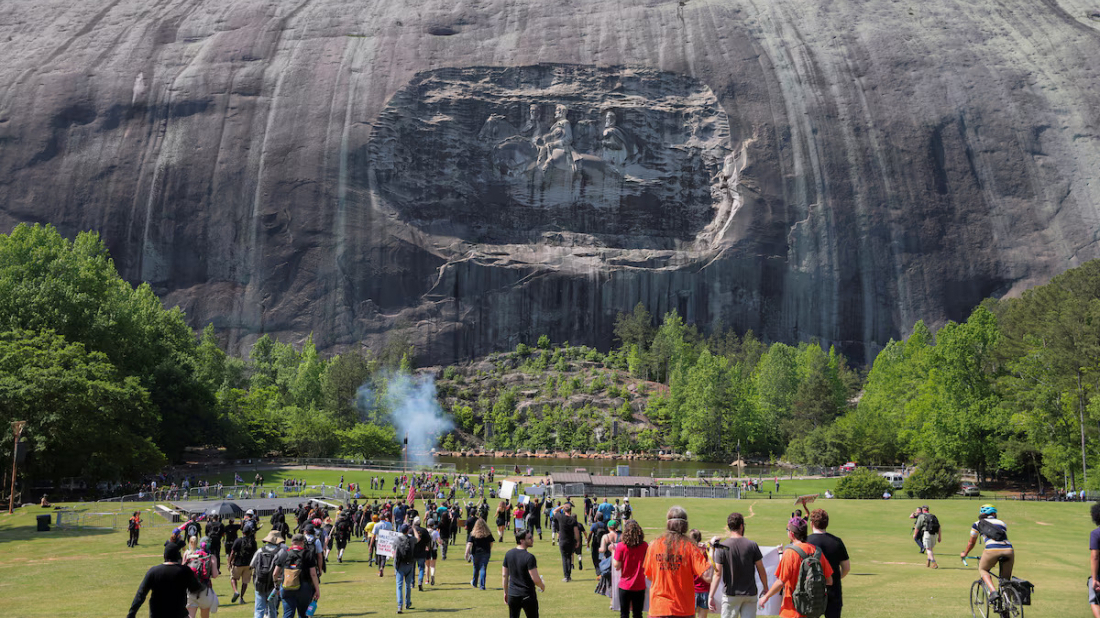Turkish F-16 crashes near highway in western Türkiye, pilot killed
A F-16 fighter jet of the Turkish Air Force crashed near a highway in western Türkiye early on Wednesday (25 February), killing its pilot, officials ...

The imposing figures of three Confederate leaders, carved into the granite face of Georgia’s Stone Mountain, have loomed over the landscape outside Atlanta since the 1970s, a silent tribute to the Southern cause in the U.S. Civil War.
Supporters view the monument, often likened to Mount Rushmore, as an honour to those who fought and died for the Confederacy in the 1861–65 conflict. Critics, however, have long regarded it as a symbol of white supremacy and say its meaning must be confronted and placed in proper historical context in the pursuit of racial justice.
To that end, the Republican-led state government has allocated $14 million to redesign the museum at the mountain’s base, with the aim of presenting a more balanced interpretation of what the vast bas-relief carving represents.
“The past is ugly,” said Reverend Abraham Mosley, the first Black chairman of Stone Mountain Park’s governing board, referring to the Confederacy’s ties to slavery and the South’s enduring legacy of racism — themes the current museum downplays.
However, the project now faces a lawsuit that could halt progress just months before the new museum is due to open. The Sons of Confederate Veterans (SCV), a group dedicated to defending the Southern cause, argue that state law mandates Stone Mountain to stand as a “tribute to the bravery and heroism” of those who fought for the Confederacy. The planned redesign, they claim, would dishonour that legacy and breach the law.
Depicting Confederate President Jefferson Davis alongside Generals Robert E. Lee and Thomas “Stonewall” Jackson, all on horseback, the monument has long romanticised the Confederacy’s “lost cause” as noble and just. The museum currently portrays the war as the South’s battle to defend states’ rights against federal overreach.
The redesign, approved in the aftermath of George Floyd’s killing in 2020, contrasts sharply with President Donald Trump’s previous efforts to remove educational and cultural content, including at the Smithsonian Institution that emphasised racism’s role in shaping American history. A White House spokesperson declined to comment, referring all questions to Georgia authorities.
Although there are no plans to alter the monument itself, the updated museum exhibits would highlight slavery as the central issue dividing the industrial North and agrarian South, a division that ultimately led to the Confederacy’s creation and the Civil War.
Some displays will also examine Stone Mountain’s dark history as a gathering site for Ku Klux Klan cross-burnings and its later association with the Civil Rights Movement, which was gaining momentum when the carving was commissioned.
“It’s a real challenge to reinterpret Stone Mountain, and I admire the attempt but the devil will be in the detail,” said W. Fitzhugh Brundage, a historian specialising in race and the American South at the University of North Carolina at Chapel Hill.
The SCV’s legal challenge remains in its early stages. Martin O’Toole, the group’s Georgia spokesperson, accused the park’s board of pandering to “woke ideology.”
“They can take it all down to Atlanta if they want,” O’Toole said of the new exhibits. “But it doesn’t belong there.”
Filed in Georgia’s DeKalb County, the lawsuit seeks an injunction to block the work, arguing that the redesign would “radically revise” the museum’s purpose in violation of state law.
Reverend Mosley, who also serves as pastor of Mount Pleasant Baptist Church in Athens, Georgia, said the goal was to make the park a place for everyone. He declined to give specific details about the forthcoming exhibits but added, “It’s a challenge, yet we want it to be for all people.”
Iran has signed a secret €500 million arms deal with Russia to rebuild air defences, weakened during last year’s war with Israel, the Financial Times has reported. The agreement, signed in December in Moscow, will see Russia deliver 500 Verba launch units and 2,500 9M336 missiles over three years.
A British national was among at least 19 people killed when a passenger bus plunged off a mountain highway into the Trishuli river in Nepal before dawn on Monday (23 February), authorities said. A New Zealander and a Chinese national were among those injured.
Seven people were killed after gunmen ambushed a police patrol in Kohat, a district in Pakistan’s north-west near the Afghan border, on Tuesday, in an attack that comes amid rising militant violence and heightened tensions between Pakistan and Afghanistan.
The Taliban in Kabul has rejected Russian claims that more than 23,000 militants from around 20 international terror groups are currently operating within Afghanistan.
Four years after Russia launched its full-scale invasion of Ukraine on 24 February 2022, the war is no longer defined by shock but by scale.
Start your day informed with AnewZ Morning Brief. Here are the top news stories for the 25th of February, covering the latest developments you need to know.
Australia’s Prime Minister, Anthony Albanese, was temporarily evacuated from The Lodge to safety on Tuesday night after an alleged bomb threat linked to upcoming performances in Australia by Shen Yun, a U.S.-based classical Chinese dance and music company banned in China.
The Foreign Intelligence Service of the Russian Federation (SVR) on Tuesday (25 February) accused the United Kingdom and France of actively working to provide Ukraine with nuclear weapons.
President Donald Trump delivered the first State of the Union address of his second term to Congress on Wednesday (25 February), declaring that America’s “golden age” had begun and that the country was experiencing a “turnaround for the ages.”
German Chancellor Friedrich Merz is heading to Beijing on for his first official visit as chancellor, aiming to strengthen political and economic dialogue with China before tackling pressing international crises.
You can download the AnewZ application from Play Store and the App Store.

What is your opinion on this topic?
Leave the first comment